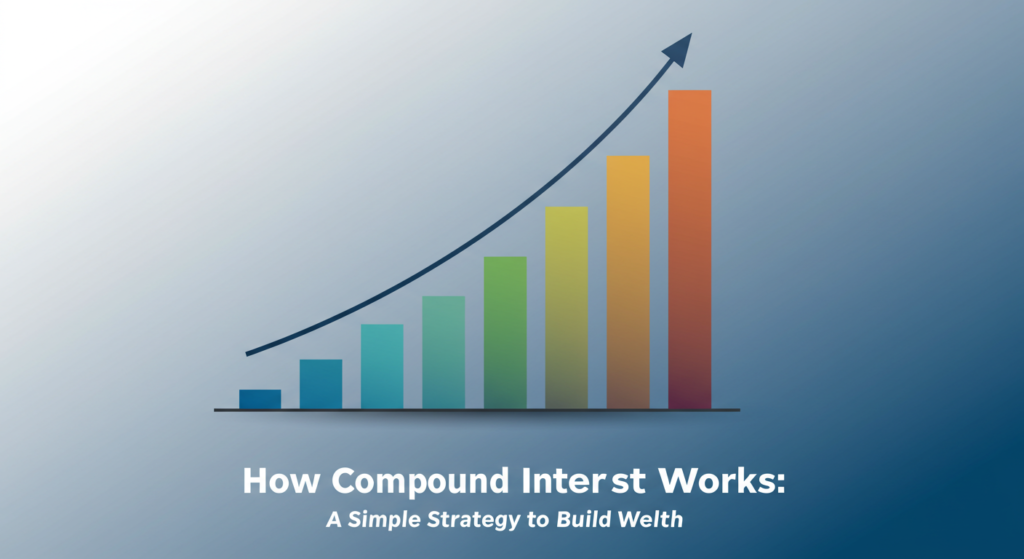How Compound Interest Works: A Simple Strategy to Build Wealth

Compound interest is often referred to as the "eighth wonder of the world," and for good reason. It has the power to transform small, consistent investments into significant wealth over time. Understanding how compound interest works is essential for anyone looking to grow their savings and secure a strong financial future. Here’s a breakdown of this powerful concept and how you can leverage it to build wealth.
What Is Compound Interest?
Compound interest is the interest earned on both the original principal amount and the accumulated interest from previous periods. Unlike simple interest, which is calculated only on the principal, compound interest grows exponentially over time.
Formula for Compound Interest:
Where:
- A: Final amount after interest
- P: Principal amount
- r: Annual interest rate (decimal)
- n: Number of times interest is compounded per year
- t: Time in years
How Compound Interest Builds Wealth
The key to maximizing the benefits of compound interest is time. The longer your money remains invested, the more it grows. Here’s why:
- Reinvestment of Earnings: Interest earned is added to your balance, which then earns more interest.
- Exponential Growth: Over time, the growth accelerates as the interest compounds.
Example: The Power of Starting Early
Consider two investors:
- Investor A starts investing $5,000 annually at age 25 and stops at age 35. Total contribution: $50,000.
- Investor B starts investing $5,000 annually at age 35 and continues until age 65. Total contribution: $150,000.
Assuming an annual return of 7%, Investor A will have more money at age 65 due to the extra 10 years of compounding.
Key Benefits of Compound Interest
- Wealth Accumulation: Even small contributions grow significantly over time.
- Passive Growth: Your money works for you, requiring minimal effort.
- Inflation Protection: Long-term investments can outpace inflation.
Strategies to Leverage Compound Interest
1. Start Early
The earlier you start investing, the more time compound interest has to work its magic. Even modest contributions can grow into substantial sums over decades.
2. Make Regular Contributions
Consistency is key. Automating monthly contributions to a savings or investment account ensures you stay on track.
3. Reinvest Earnings
Avoid withdrawing interest or dividends. Reinvest them to maximize the compounding effect.
4. Choose High-Interest Accounts or Investments
Look for options with competitive interest rates or strong returns, such as:
- High-yield savings accounts
- Certificates of deposit (CDs)
- Stocks and mutual funds
- Retirement accounts (e.g., 401(k), IRA)
5. Be Patient
Compound interest takes time to show significant results. Focus on the long-term benefits and resist the temptation to withdraw funds early.
Common Mistakes to Avoid
- Starting Late: The earlier you start, the less you need to save monthly.
- Interrupting Contributions: Consistency is vital for compounding.
- Ignoring Fees: High fees can eat into your returns. Choose low-cost investment options.
Tools to Help You Calculate Compound Interest
- Compound Interest Calculators: Available online to estimate growth based on your contributions and time horizon.
- Financial Apps: Apps like Mint, Personal Capital, or Acorns can help track your savings and investments.
Final Thoughts
Compound interest is a simple yet powerful tool for building wealth. By starting early, contributing consistently, and letting time do its work, you can achieve significant financial growth. Whether you’re saving for retirement, a home, or a dream vacation, understanding and leveraging compound interest is a cornerstone of smart financial planning.
FAQs
1. How is compound interest different from simple interest?
Compound interest grows faster because it accounts for interest on previously earned interest, whereas simple interest only applies to the principal amount.
2. What types of accounts benefit from compound interest?
Savings accounts, retirement accounts, and investments in mutual funds or ETFs benefit most from compounding.
3. How often is interest compounded?
It depends on the account. Common intervals include daily, monthly, quarterly, or annually.
4. Can compound interest help with debt repayment?
Yes, but in reverse. Debt with high compound interest, like credit card balances, grows quickly, so it’s essential to pay it off as soon as possible.
Leave a Reply